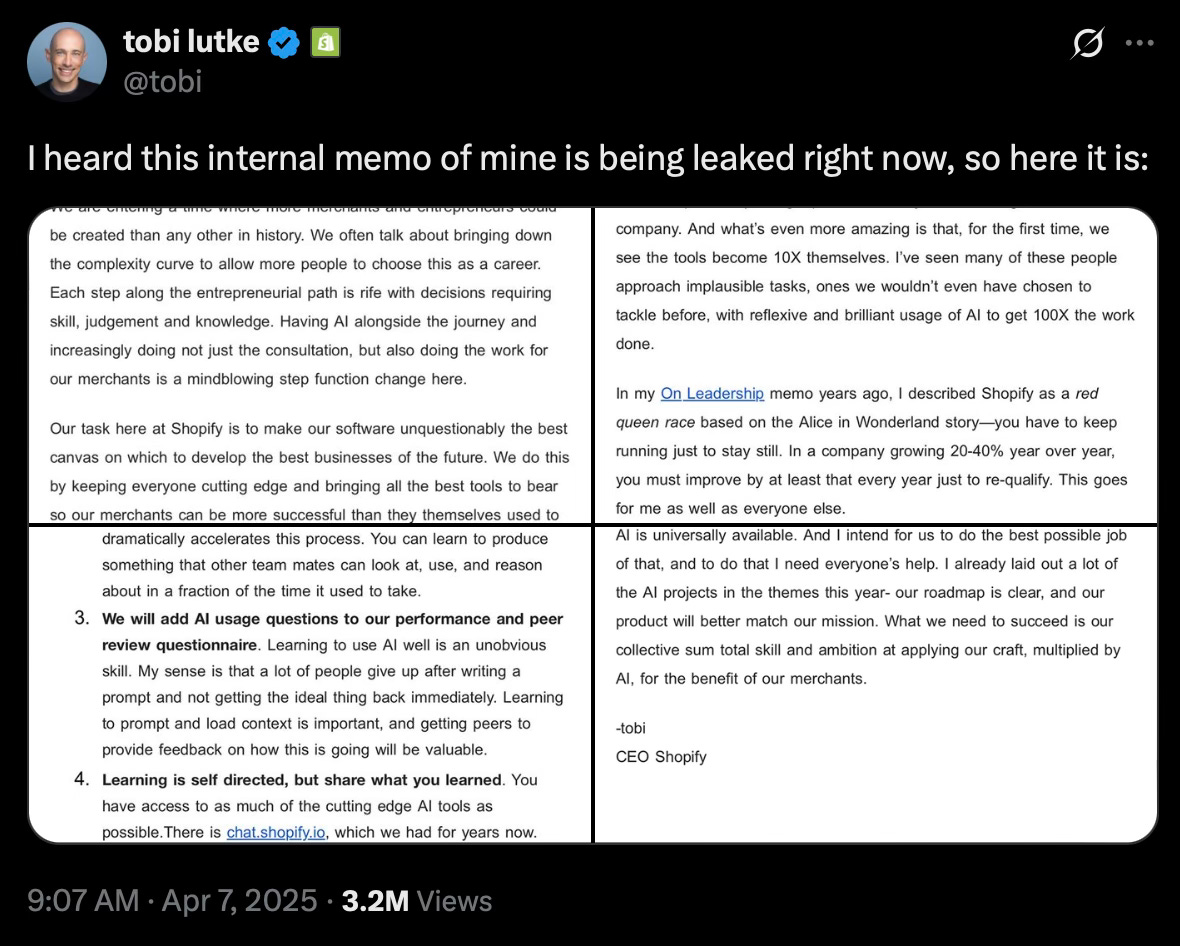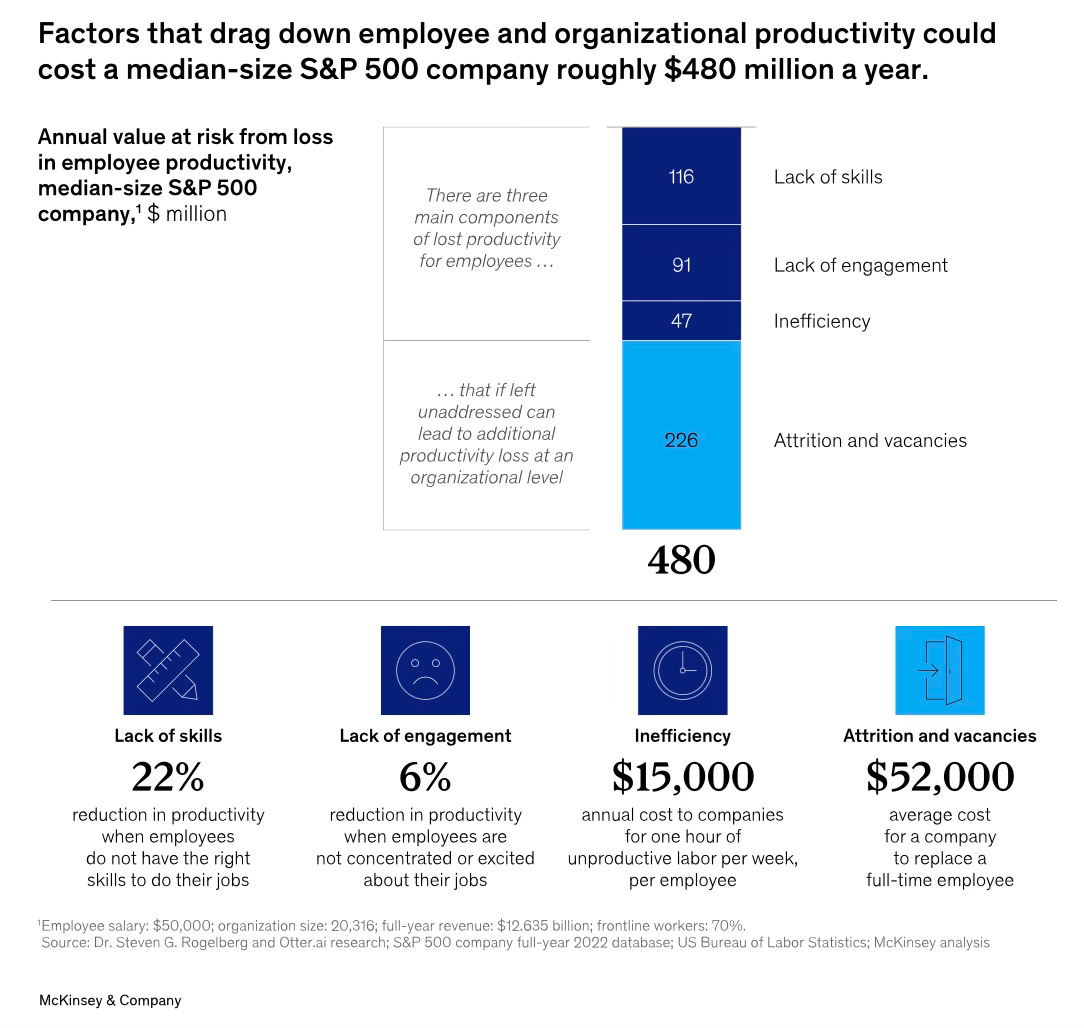Human Capital Intel - 4/16/25
"AI before hire" | Economic policy uncertainty freezes decisions | HR data literacy | Employees exaggerate AI skills | Skill shifts force rapid re-learning
Welcome to the latest edition of Human Capital Intelligence, your weekly brief synthesizing over 250 leadership, HR, and people sources to filter out the noise. As always, we would love to hear from you at ken@reyvism.com with questions you’d like answered or topics covered.
Sent this by a friend? Sign up here to receive HCI in your inbox every week.
By Ken Stibler; Powered by Reyvism Analytics

The new AI hiring principle
The emergence of AI as a prerequisite for hiring decisions represents a paradigm shift in corporate workforce planning. Shopify's CEO Tobi Lütke has established a clear directive: teams must prove AI incapability before requesting additional headcount, making AI integration mandatory across all workflows and even factoring AI usage into employee performance reviews.
Early adopters of this AI-first philosophy are already reporting substantial efficiency gains. At Salesforce, AI agents resolved 84% of customer queries independently within three months, allowing the redeployment of approximately 2,000 support staff to other functions.
Today’s CEOs are the final generation of executives leading exclusively human workforces. Going forward, we’ll need to learn how to manage human workers and digital labor to work together to deliver efficiency and productivity. Integrating AI agents into daily operations will become a leadership skill that separates companies that thrive from those that fall behind
— Salesforce CEO, Mark Benioff
According to Morgan Stanley research, Salesforce clients are experiencing 20% to 50% cost reductions in customer support through savings in personnel, office space, and overhead expenses. This trend coincides with five consecutive quarters of productivity growth at or above 2%, defying recent historical patterns despite shrinking labor pools.
The convergence of rapidly advancing AI capabilities with economic uncertainty could accelerate this transformation. With three-quarters of CEOs surveyed believing a recession is either somewhat or very likely, cost-cutting pressures are mounting.
Approximately 10% of chief executives report considering hiring freezes and workforce reductions, with one bluntly stating that the next step given tarrifs and AI is to "fire 20% of my staff." As Klarna CEO Sebastian Siemiatkowski asserted, "AI can already do all of the jobs that we as humans do" – a sentiment that suggests the combination of economic headwinds and AI advancement could become the catalyst for significant workforce restructuring.
What’s Next: HCI has been beating this drum for over a year now, AI adoption is not just a nice to have, but is increasingly a competitive necessity. Go read the Shopify memo for yourself and just imagine the implications if your top competitor adopted the same approach.
Tariffs freeze business decisions
President Trump's sweeping tariffs have effectively paralyzed corporate decision-making across America, with companies postponing critical investments and hiring plans amid unprecedented uncertainty. Manpower Group executive Ger Doyle noted that businesses are "locked in place" and focused on "preserving the status quo for now," while cautioning that continued uncertainty could put "layoffs back on the table."
Indeed Hiring Lab economist Cory Stahle observed that "the velocity with which these policy changes are now happening is so fast that many employers will find it challenging to find the stability needed to maintain business as usual." This strategic paralysis is reflected in slowing employment growth, with multiple industries already experiencing flat growth even before the tariff announcements.
The Russell 2000, a key indicator of small business health, has plummeted nearly 20% this year, signaling a dramatic loss of confidence across Main Street. With labor market experts like Mischa Fisher of Udemy declaring March's employment figures "already out of date" following the tariff announcements, companies remain trapped in a vicious cycle where rising costs collide with customer pullback, leaving capital expenditures and workforce expansion plans in suspended animation.
If you missed it last week - read the Simple SMB Tariff Playbook at KenStibler.com.
Quote of the Week: Slowing labor market
“Many job seekers continue to face a slow hiring market, resulting in the lowest levels of workforce confidence we have seen across LinkedIn—even lower than [during] the pandemic.”
—LinkedIn’s Kory Kantenga, head of economics for the Americas
Reading List:
Amazon looks bottom up to cut red tape amid efficiency push
Amazon CEO Andy Jassy is attacking bureaucracy by flattening the company's structure and implementing over 375 employee-suggested changes to streamline operations. Having already exceeded his target of increasing individual contributors relative to managers by 15%, Jassy emphasizes that this shift gives frontline employees "more ownership" to "move more quickly" - echoing similar management restructuring at Meta, Google, and Shopify where executives have systematically reduced middle management layers to enhance decision-making speed in today's competitive tech environment.
What’s Next: Just as small businesses market their agility, line-level employees have an increasing role to play in driving strategy and organizational shifts as the pace of change accelerates and the window to pivot narrows.
Employees exaggerate AI knowledge
91% of C-suite executives and 79% of tech workers admit to pretending they know more about AI than they actually do, according a survey of 1,200 professionals. This knowledge gap exists despite nearly all executives surveyed declaring AI skills critical for job security, despite 61% of workers report using AI tools is viewed as "lazy" in their companies. The stakes are high—50% of employers now list AI skills as "highly preferred" in hiring, 20% as "mandatory," and 84% are willing to replace or outsource talent lacking these capabilities. Meanwhile, worker anxiety has intensified, with 90% fearing AI replacement and concern about skill obsolescence jumping 17% since last year's survey.
What’s Next: Rolling out an AI upskilling strategy is increasingly relevant for employee engagement and confidence just as much as - the best part, the current tools can do a lot of the heavy lifting for you. HCI is developing an AI Adoption Strategy Generator, reach out if you’re interested in participating in a beta-test.
HR needs data literacy
HR departments face a critical 12-18 month window to strengthen their data foundations before losing competitive advantage in the AI revolution, warns Culture Amp's Chief People Officer Justin Angsuwat. With AI agent adoption expected to reach 50% by 2027, Angsuwat outlines a four-stage data maturity framework (descriptive, diagnostic, predictive, and prescriptive) and cautions against purchasing expensive AI tools before establishing structured data ecosystems.
As McKinsey research indicates nearly 90% of leaders expect AI to drive revenue growth within three years, Angsuwat insists tomorrow's HR decisions will demand data-informed approaches rather than gut feelings, mirroring the analytical sophistication already seen in marketing and sales departments.
What’s Next: If the people leaders aren’t comfortable, upskilling will struggle. Target the highest ROI adopters of AI - people leaders - sooner than later.
Data Point: AI Anxiety
90%
Number of workers who said they’re more afraid of being replaced by AI now than they were a year ago
In Other News:
I Thought I Was an Ideal Leader. Instead I Was a Cautionary Tale. (Wall Street Journal)
Why Americans Are Working Less. (Gallup)
Layoffs reached a near record high in March, most from DOGE’s hatchet job on the federal workforce. (HR Brew)
Why Major Employers Are Seeking A Shared Hiring Language. (Forbes)
Want to grow your business? Put a people strategy in place first. (Employee Benefits News)
Rise Of ‘Boreout Syndrome’: The Opposite Of Burnout With Similar Signs. (Forbes)
Remote monitoring references are up 216% in the past 4 years, Glassdoor says. (HR Dive)
The Locker-Room Playbook for Managing Gen Z Employees. (Wall Street Journal)
TodayTix CEO took over at 31. He tells aspirational Gen Zers to ditch the ‘fake it till you make it’ act if they actually want to be successful. (Fortune)




